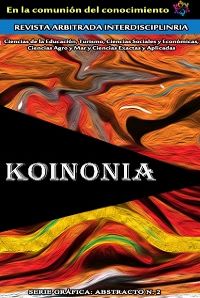Chess at school. Didactic resource for cognitive development
DOI:
https://doi.org/10.35381/r.k.v7i14.1862Keywords:
Educational games, teaching materials, developmental psychology. (UNESCO Thesaurus).Abstract
The objective is to analyze chess at school, a didactic resource for cognitive development. From a quantitative descriptive documentary methodological perspective with bibliographic design, taking as referential bases of content selection, the following: Scielo, Redalyc, Scopus, WOS, PubMed, from where 15 articles were obtained. The evidence of the scrutinized works shows that chess is a favorable didactic resource because in this process of playing chess, logic, analysis, inference, processes of a critical and reflexive thinker are placed in the foreground, in reference to locate multiple answers to problems or dilemmas to be solved with the intention of winning the game.
Downloads
References
Beltrán-Pabón, C. A., Rodríguez Pérez, E. G., & Vergel Ortega, M. (2021). Factores que inciden en el desarrollo del pensamiento lógico - numérico en estudiantes con déficit de atención e hiperactividad: una estrategia a través del ajedrez en el municipio de los patios [Factors that influence the development of logical-numerical thinking in students with attention deficit and hyperactivity: a strategy through chess in the municipality of Los Patios]. Revista Boletín Redipe, 10(11), 504–513. https://doi.org/10.36260/rbr.v10i11.1555
Bonell, C., Blakemore, S. J., Fletcher, A., & Patton, G. (2019). Role theory of schools and adolescent health. The Lancet. Child & adolescent health, 3(10), 742–748. https://doi.org/10.1016/S2352-4642(19)30183-X
Dowd, S. B., & Root, A. (2003). The hospital manager and game theory: chess master, poker player, or cooperative game player? The health care manager, 22(4), 305–310. https://doi.org/10.1097/00126450-200310000-00003
Escobar, B. (2016). El Ajedrez como Estrategia Didáctica para la Motivación del Aprendizaje en los Estudiantes de Educación Inicial [Chess as a Didactic Strategy for the Motivation of Learning in Early Childhood Education Students]. Sinopsis Educativa Revista Venezolana de Investigación, 16(1y2), 9-17. Recuperado a partir de https://revistas.upel.edu.ve/index.php/sinopsis_educativa/article/view/6698/3800
Escobar-Domínguez, D., & Escobar-Domínguez, D. (2018). El ajedrez educativo como innovación [Educational chess as an innovation]. Padres y Maestros / Journal of Parents and Teachers, (373), 56-61. https://doi.org/10.14422/pym.i373.y2018.009
Fernández-Amigo, J., P. B. Jordi, M. A. Miriam, G. B. Xavier. (2018). Ajedrez Educativo: Nuevo Bloque monográfico En Las Jornadas DIM [Educational Chess: New Monographic Block In The DIM Conferences]. DIM: Didáctica, Innovación Y Multimedia, 36. https://raco.cat/index.php/DIM/article/view/340821.
García-Millán, H., & Blanch Plana, Á. (2016). Tecnochess. Una propuesta didáctica innovadora para trabajar las competencias lingüística, tecnológica y matemática mediante el juego del ajedrez y las TIC [Tecnochess. An innovative didactic proposal to work on linguistic, technological and mathematical skills through the game of chess and ICT]. RIITE Revista Interuniversitaria de Investigación en Tecnología Educativa, (1). https://doi.org/10.6018/riite/2016/263991
Lotero-Correa, F. D., & Cano-Velásquez, O. A. (2018). Componente táctico del rendimiento en ajedrez: propuesta de un método de enseñanza y entrenamiento en la edad infantil, de 7 a 12 años []. VIREF Revista De Educación Física, 6(4), 80–159. Recuperado a partir de https://revistas.udea.edu.co/index.php/viref/article/view/329476
Miramontes-Hernández, E. A. (2017). El ajedrez, herramienta accionadora de las habilidades cognitivas necesarias para el estudio de la matemática [Chess, a tool to activate the cognitive skills necessary for the study of mathematics]. PädiUAQ, 1(1), 137–148. Recuperado a partir de https://revistas.uaq.mx/index.php/padi/article/view/63
Perera-Borrego, M. A., & Martín-Gámez, C. (2018). ¿Jugamos al ajedrez y aprendemos ciencias? [Do we play chess and learn science?]. Ápice. Revista de Educación Científica, 2(1), 18-29. https://doi.org/10.17979/arec.2018.2.1.2885
Pérez-Peña, L. (2015). El ajedrez en el desarrollo intelectual de la primera infancia [Chess in early childhood intellectual development]. VARONA, (60),54-60. Disponible en https://www.redalyc.org/articulo.oa?id=360637746009
Sandoval-Benavides, M. G., Villegas Santillán, M. T., & Vega Esparza, R. M. (2019). Desarrollo moral en los estudiantes mexicanos: Un análisis de la visión de justicia de la teoría de Kohlberg [Moral development in Mexican students: An analysis of Kohlberg's view of justice]. JURÍDICAS CUC, 15(1), 69–95. https://doi.org/10.17981/juridcuc.15.1.2019.03
Schonert-Reichl, K. A., Oberle, E., Lawlor, M. S., Abbott, D., Thomson, K., Oberlander, T. F., & Diamond, A. (2015). Enhancing cognitive and social-emotional development through a simple-to-administer mindfulness-based school program for elementary school children: a randomized controlled trial. Developmental psychology, 51(1), 52–66. https://doi.org/10.1037/a0038454
Soutullo, M. (2010). El ajedrez en la escuela: hacia una nueva forma de enseñar el ajedrez en las escuelas [Chess at school: towards a new way of teaching chess in schools]. Recuperado de https://n9.cl/794ca
Stegariu, V. I., Abalasei, B. A., & Stoica, M. (2022). A Study on the Correlation between Intelligence and Body Schema in Children Who Practice Chess at School. Children (Basel, Switzerland), 9(4), 477. https://doi.org/10.3390/children9040477
Published
How to Cite
Issue
Section
License
CC BY-NC-SA : Esta licencia permite a los reutilizadores distribuir, remezclar, adaptar y construir sobre el material en cualquier medio o formato solo con fines no comerciales, y solo siempre y cuando se dé la atribución al creador. Si remezcla, adapta o construye sobre el material, debe licenciar el material modificado bajo términos idénticos.
OAI-PMH URL: https://fundacionkoinonia.com.ve/ojs/index.php/revistakoinonia/oai.









